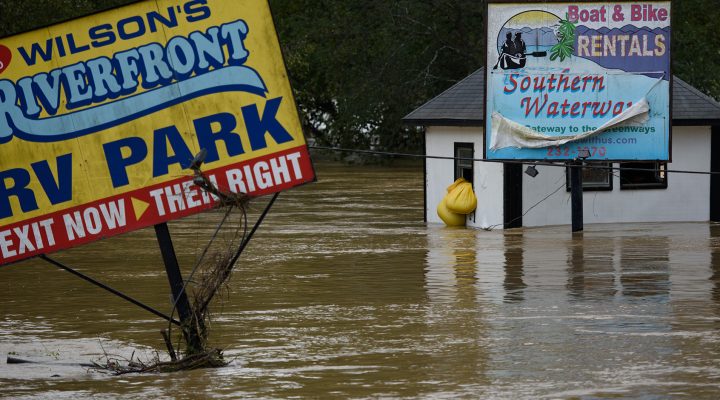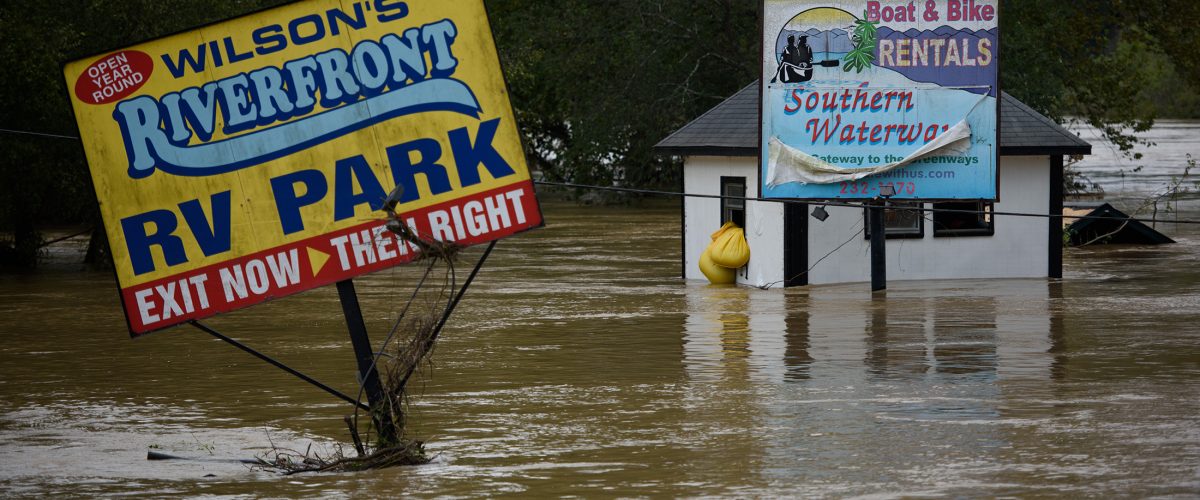1. Hottest year on record. 2024 is virtually certain to be the hottest year on record, surpassing the previous hottest year from the prior year, which crushed the next closest year by more than 1 degree. The year included the three hottest days in recorded history. Most disturbingly, we experienced for the first time in recorded history a global temperature average of at least 1.5 degrees Celsius above pre-industrial levels for 12 consecutive months, a critical temperature limit established in the Paris Agreement. This alarming trend is attributed to human-induced climate change, compounded by natural phenomena such as El Niño.

Don Gordon
2. Donald Trump elected president. Donald Trump defeated Kamala Harris to become president with the outspoken and sometimes outrageous promises to undo the Biden and Obama administration’s investments in the environment. As he did in 2016, Trump almost certainly will withdraw the U.S. from the Paris Climate Accord, an international commitment to confront climate change. His campaign motto of “Drill baby, drill” was a signal to the fossil fuel industry that subsidies and support will be abundant, while the support for clean energy and electric vehicles will wither on the vine (unless of course, Elon Musk and Tesla need a hand). Trump also is likely to overturn EPA regulations, as he did in his first term, removing protections for wetlands and reducing many safeguards citizens need to protect them from profit-motivated industries.
“Who would have thought Asheville, N.C., would be decimated by a hurricane?”
3. Hurricane Helene and her cousins. Hurricane Helene devastated parts of the Southeast in late September, taking 232 lives to become the deadliest hurricane to hit the U.S. since Katrina 19 years ago. The storm showed the growing threat of inland flooding far from the coastal areas that are more accustomed to dealing with this kind of severe weather. Who would have thought Asheville, N.C., would be decimated by a hurricane? One woman who moved to Asheville from California to escape its floods, earthquakes and wildfires said, “I guess there’s nowhere that’s safe anymore.” And while Hurricane Helene was the most surprising and deadliest severe weather event, it was not the most expensive. The $55 billion price tag of Helene fell short of the $60 billion cost of Hurricane Milton, cutting through the middle of Florida, ripping it in half. Other extreme weather events devastated other parts of the world: 141 dead from cyclones in the Philippines, 192 dead from floods in Nepal, 136 dead from wildfires in Chile, 213 from an earthquake in Japan.
4. Climate-induced inflation. One of the key issues in the 2024 presidential election was inflation. As is common, the current president, Joe Biden, was blamed for the increased prices of food, housing and everything else. Of course, there are global factors causing inflation that are less obvious and immune from national policies. For example, the Mississippi River was so affected by drought in 2024 that many places across its route were unnavigable, disrupting supply chains and raising prices on food and grains. Record-breaking temperatures in countries along the Mediterranean Sea led to a drop in global olive oil production by one-third. Prices increased as a result. Severe droughts, followed by massive rainfall, reduced China’s grain production (the largest in the world) by 9% in recent years. And if you noticed your favorite chocolates are more expensive, you’re right. Ghana and Ivory Coast, which produce nearly 60% of global cocoa, experienced severe rainfall in 2024, destroying yields, causing the price of cocoa to increase almost threefold. Similarly, orange production reduced 40% from 2020 to 2024 in Florida, Texas and California due to droughts and floods, making prices soar almost double in this time period.
“Around the world in 2024, three out of four people experienced at least 31 days of extreme heat.”
5. Climate impacts on health. Climate also had a deep impact on the health of people around the world. In addition to causing 8 million premature deaths each year, particulate pollution from burning fossil fuels is responsible for up to a third of premature births worldwide. Around the world in 2024, three out of four people experienced at least 31 days of extreme heat. This included the extreme heat that caused the deaths of 1,300 pilgrims during this year’s Hajj to the holy city of Mecca. We’ve noted the immediate deaths that resulted from Hurricane Helene, but there were further impacts on health due to undrinkable water supplies, lack of electricity for medical needs (think of oxygen tanks), and inaccessible food sources. Take this kind of event to third world countries, and you can imagine the death and disease that spreads throughout a region.
6. Climate impact on infrastructure. I remember when a heatwave hit Canada a couple of years ago, there were reports and photos of roads that were melting. In 2024, some places got so hot “bridges can literally fall apart like Tinkertoys,” said one civil engineer. Climate affects not only people, animals and oceans. It also impacts buildings, roads and cities. The power of Hurricane Helene swept away homes, church buildings and some entire towns, like Chimney Rock, N.C. There were a record 28 weather and climate disasters costing at least $1 billion each in the U.S. in 2024, with a collective price tag of about $94 billion. The insurance industry is unwilling to underwrite such risks and some insurers are no longer renewing policies in much of Texas, Florida and Louisiana. People are on their own. The largest wildfire in Texas state history scorched more than 1 million acres in a few days in February, impacting dozens of structures. To put this into perspective, this would be like burning down the entire state of Delaware.
7. Clean energy soars. The news was not all bad in 2024. Clean energy continued to soar, making up 90% of new energy capacity. Meanwhile, China installed more solar last year alone than the U.S. has in its entire history. Nations across the world are recognizing a green economy is the future, so there are major projects taking place in the U.S. and the world to replace old fossil-fuel-run plants with energy-efficient ones. The Sherco coal power plant in Minnesota, for example, is being repurposed for a clean energy grid. China and Norway are on their way to utilizing clean energy cargo ships which can transport their products around the world. Currently, clean energy accounts for 30% of the world’s total energy capacity. This is a positive trajectory, but it must accelerate faster. It needs to increase to 90% in a short-time period to help us reach goals set by the Paris Climate accords.
8. Environmental injustice. Across the country, people fought for environmental justice — against the dumping of environmental problems on communities with low income and high minority populations. One example was Clairton, Pa., where residents worked to get the owners of a coke plant to take responsibility for the long-term harm it has done to local air. The coal-powered plant owned by U.S. Steel has been fined more than $11 million for air quality violations over the past four years. Many citizens, 40% of whom are African American and 23% living below the poverty line, believe this is a “pay for pollution play” the company easily absorbs. Another example of environmental injustice stems from a bill signed by Florida Gov. Ron DeSantis that bans heat protections for outdoor workers, a measure that opponents said was cruel and inhumane.
9. Environmental cost of war. 2024 was marked by unbearable levels of war and destruction degrading the environment. From the Israel-Hamas war in Gaza to the Russian invasion in Ukraine as well as the civil wars in Sudan and parts of Africa, the impact on energy and the environment is enormous, not to mention the human toll. The United Nations Environment Program began a preliminary assessment of the Gaza Strip in June and found unprecedented levels of pollution, sewage, contaminated soil, air and water for those trapped and no place to go. Ukraine, considered the breadbasket of the world, has lost large swaths of farmland to contamination from bombs and landmines. Forests have been burned, bombed and contaminated, exacerbating climate change. Experts believe about 5% of fossil fuel emissions are attributed to acts of war.
10. Red state resistance. Surprising many people was the resistance to environmental neglect and degradation coming from red states like Montana. Sixteen young Montanans, from ages 7 to 23, brought a lawsuit against the state for issuing fossil fuel permits without taking into account the impact of greenhouse gas emissions. They argued this violated their constitutional right to a clean environment. The Montana District Court ruled in favor of the young plaintiffs. While state officials tried to overturn this groundbreaking decision on appeal, the Montana Supreme Court ultimately upheld the decision 6-1. “This ruling is a victory not just for us, but for every young person whose future is threatened by climate change,” lead plaintiff Rikki Held said.
Don Gordon is founder and CEO of C3 — Christians Caring for Creation. He also serves as pastor of Trinity Baptist Church in Newton, N.C.


